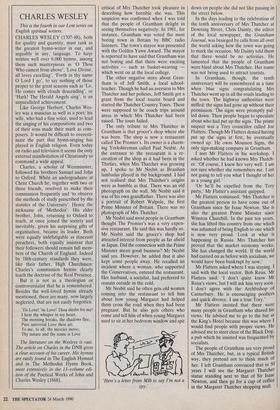CHARLES WESLEY
This is the fourth in our Lent series on English spiritual writers.
CHARLES WESLEY (1707-88), both for quality and quantity, must rank as the greatest hymn-writer in our, and arguably in any, language. To ha ;e written well over 6,000 hymns, among them such masterpieces as '0 Thou Who cattiest from above', 'Love Divine, all loves excelling', 'Forth in thy name O Lord I go', to say nothing of those proper to the great seasons such as `Lo, He comes with clouds descending', or `Hark! The Herald Angels sing', is an unparalleled achievement.
Like George Herbert, Charles Wes- ley was a musician as well as a poet: his wife, who had a fine voice, used to lead the singing of his compositions and two of their sons made their mark as com- posers. It would be difficult to overesti- mate the part that hymn-singing has played in English religion. Even today on radio and television it seems the only external manifestation of Christianity to command a wide appeal.
Charles, a scholar of Westminster, followed his brothers Samuel and John to Oxford. While an undergraduate at Christ Church he, together with two or three friends, resolved to make their communion frequently and `to observe the methods of study prescribed by the statutes of the University'. Hence the nickname of 'Methodist'. His elder brother, John, returning to Oxford to teach, at once joined the society and inevitably, given his surprising gifts of organisation, became its leader. Both were equally indefatigable as itinerant preachers, both equally insistent that their followers should remain full mem- bers of the Church of England. Indeed by 18th-century standards they were, like their father, High Churchmen: Charles's communion hymns clearly teach the doctrine of the Real Presence.
But it is not as a theologian or controversialist that he is remembered. Besides the well-loved hymns already mentioned, there are many, now largely neglected, that are not easily forgotten.
'Tis Love! 'tis Love! Thou diedst for me! I hear thy whisper in my heart. The morning breaks, the shadows flee; Pure universal Love thou art; To me, to all, thy mercies move; Thy nature and thy name is Love The literature on the Wesleys is vast. The article on Charles in the DNB gives a clear account of his career. His hymns are easily found in The English Hymnal and in The Methodist Hymn Book, most extensively in the 13–volume edi- tion of the Poetical Works of John and Charles Wesley (1868).


















































 Previous page
Previous page